Doddie Weir: The rugby legend who won't give in to MND
- Published
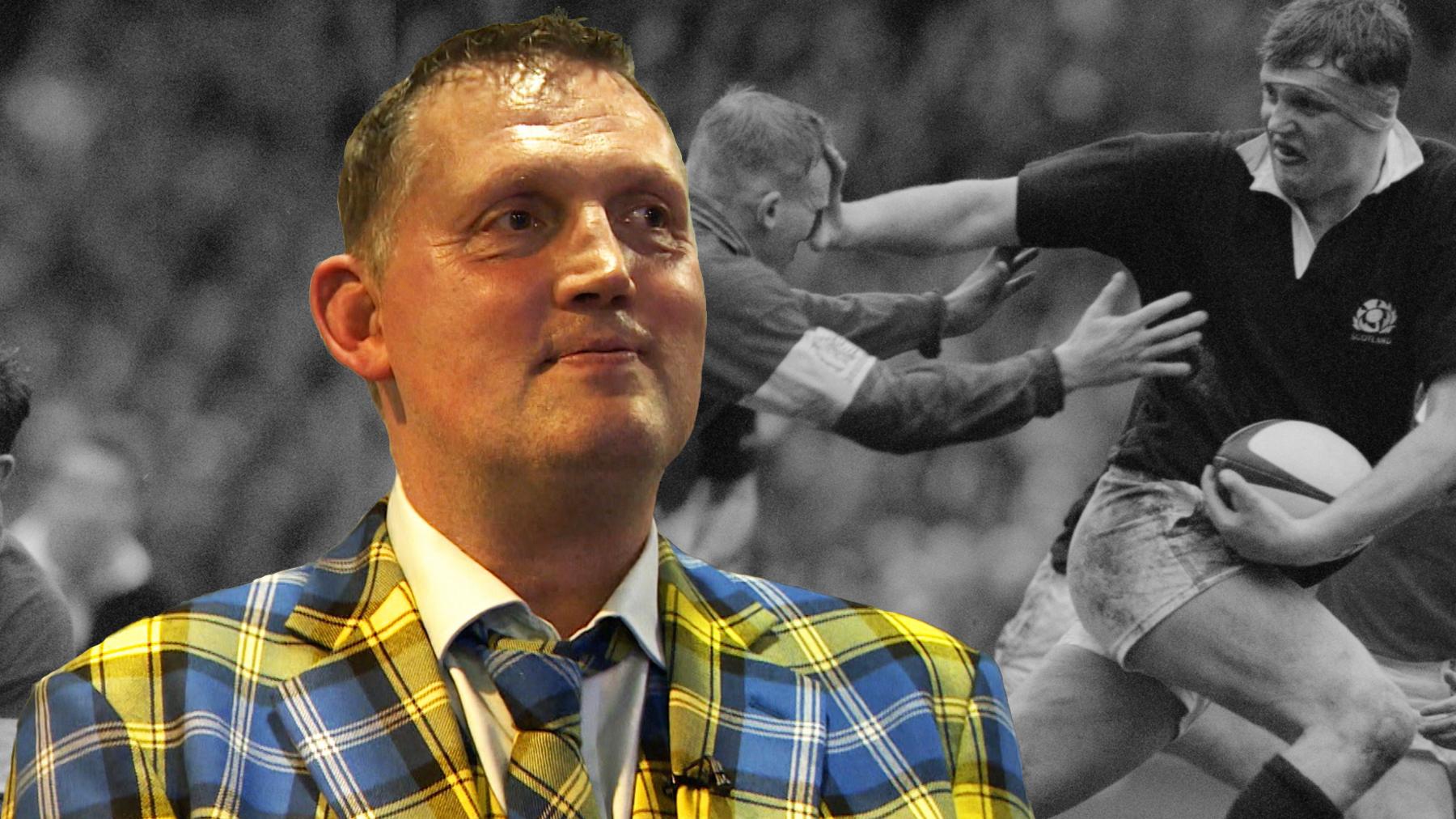
Three years ago, Scottish rugby legend Doddie Weir was given the devastating news he had motor neurone disease.
Doddie's doctor told him he would be in a wheelchair within a year. Half of sufferers can expect to live for about 18 months.
But the former Scotland and Lions star never left the rugby field without a fight, and he was determined that he would not give in to the disease.
Three years on, he is still walking, still going to his boys' rugby matches, still battling MND - and on a mission to find a cure.
'He said it would be fine'

Doddie's eldest son Hamish noticed something was amiss with his father on the family farm
Back in 2016, Doddie's son Hamish had spotted the signs that something was wrong before he knew his dad was sick.
Doddie had taken him for "one of their chats", a walk around the family farm in the Borders.
Hamish said: "We took a rugby ball and we passed it backwards and forwards and he struggled a lot with his left hand.
"But you know what he is like, he said it would be fine."
But things wouldn't be fine.
Later that year, Doddie shut his hand in a door. It hurt, and it kept hurting. Long after it should have healed, his hand started to twitch.
At the end of 2016, Doddie was told he had motor neurone disease.
His wife Kathy recalled the exact moment that changed their lives forever.
"When we were sat in that doctor's office and he said, 'You have MND' it was a big blow to me. It was a shock.
"We know things aren't going to be the same and we are not going to get that long retirement thing that we planned for.
"But at least we've got the time and the warning. We've been given this chance to make the most of our lives."

'The Mad Giraffe'
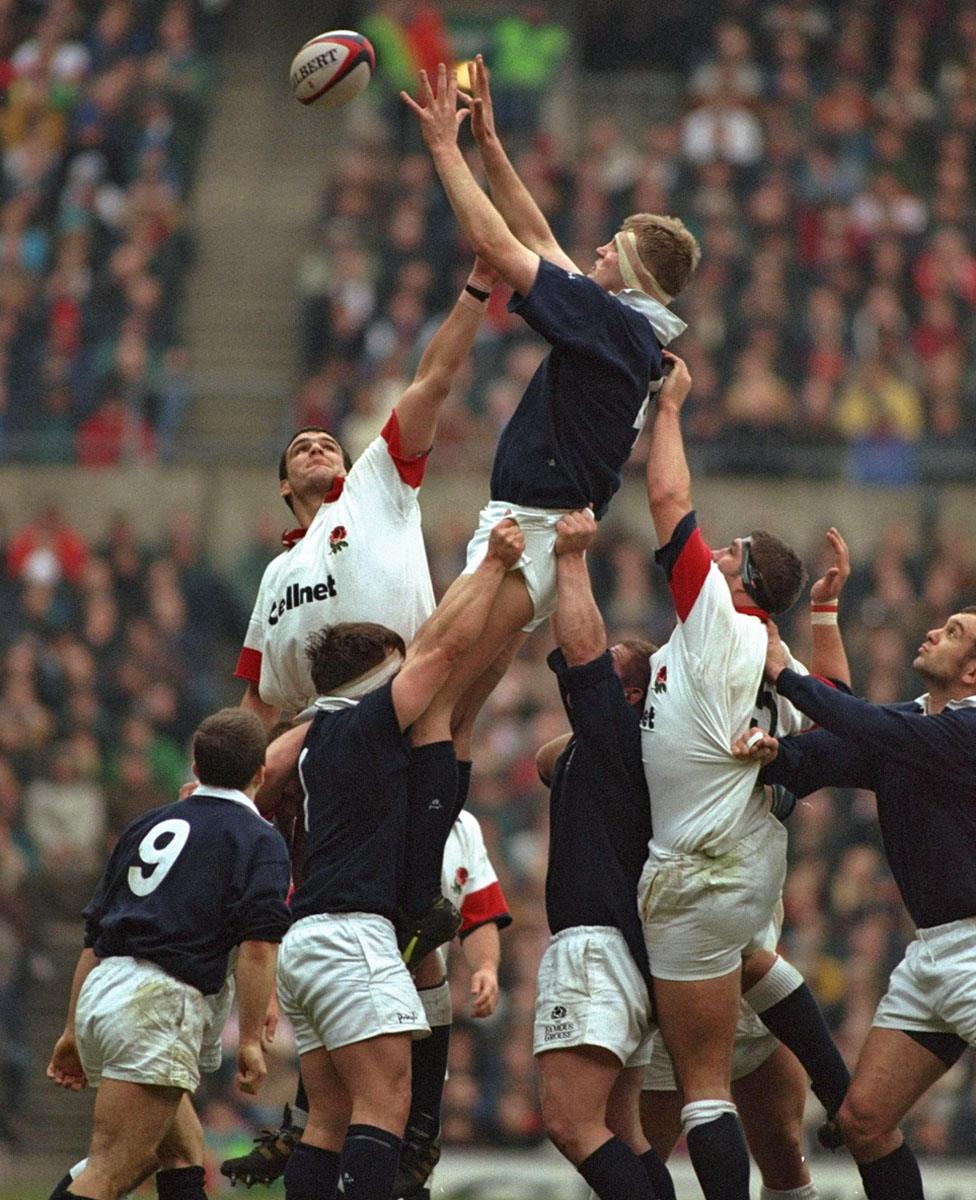
Doddie Weir playing against England in 1997

Doddie Weir is one of the best-known names in Scottish rugby history.
The 49-year-old started playing rugby for Stewart's Melville RFC. He went on to play for Melrose in the Borders, winning multiple Scottish championships with the club before joining Newcastle Falcons in 1995.
He won 61 Scottish caps through the 90s, and was selected for the British and Irish Lions tour of South Africa in 1997.
A big favourite with the Murrayfield crowd, the 6ft 6in lock was famously described by commentator Bill McLaren as as being "on the charge like a mad giraffe".
Away from the pitch he is best known as the man in the tartan suit - a sportsman and speaker, TV pundit, businessman and family man.

Doddie and Kathy kept the news to themselves over Christmas and told family in January 2017.
They didn't go public until after son Hamish had sat his exams the following spring.
They decided to make the announcement on world MND Day - 19 June - in an effort to raise awareness of the condition.
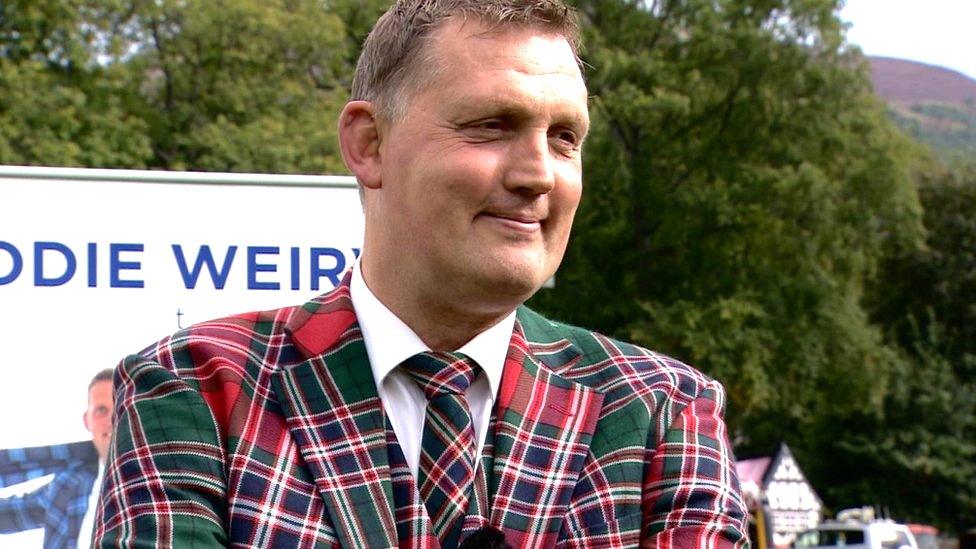
Doddie launched his foundation in 2017
Doddie promised he was going to raise money to help with research and to help people with motor neurone disease.
MND is the name of a group of illnesses affecting the nerves controlling motor functions - the movement of muscle. MND stops signals reaching the muscles. Over time the muscles weaken and stop working, inhibiting the ability to walk, talk, eat or drink unaided.
There is currently no cure and only one medicine has been licensed in the UK in the last 25 years, which can prolong life for about one to two months.
High-profile sufferers include scientist Stephen Hawking, footballer Fernando Ricksen and campaigner Gordon Aikman.
Angry and frustrated
In August 2017, Doddie gave an interview to his fellow Scotland rugby star, BBC broadcaster John Beattie.
John would follow his progress for the next two years to compile the BBC Scotland documentary Doddie Weir: One More Try, which was broadcast on BBC One Scotland on 6 December.
Doddie was angry and frustrated, saying it wasn't acceptable to have a condition for which there was no cure.
While there are exceptions - Stephen Hawking died 55 years after his diagnosis - about half of sufferers die within three years of developing symptoms.
Doddie Weir: 'The support has been mind-boggling'
Doddie used the interview to launch his charity, the My Name'5 Doddie Foundation, and said he wanted to "stop the disease".
There were tears when he said wanted to see his boys grow up, learn to drive, give them advice about girlfriends and do the things his dad did for him.
At this point, the MND was mainly affecting Doddie's hands, making everyday tasks like fastening a button difficult.
Frustration would be the prevalent emotion over the next two years - frustration at the medical profession, and frustration at the lack of help after his diagnosis.
Kathy said: "Doddie is just desperate to try something.
"He is good at the moment and we need to keep going on.
"He'll be here in five years, 10 years' time. He'll have got the cure by then."
As the year went on, Doddie began showing more physical signs of decline. His shoulders had wasted. His hands had deteriorated. He joked about needing two hands to lift a pint.
'I want to finish what Joost started'
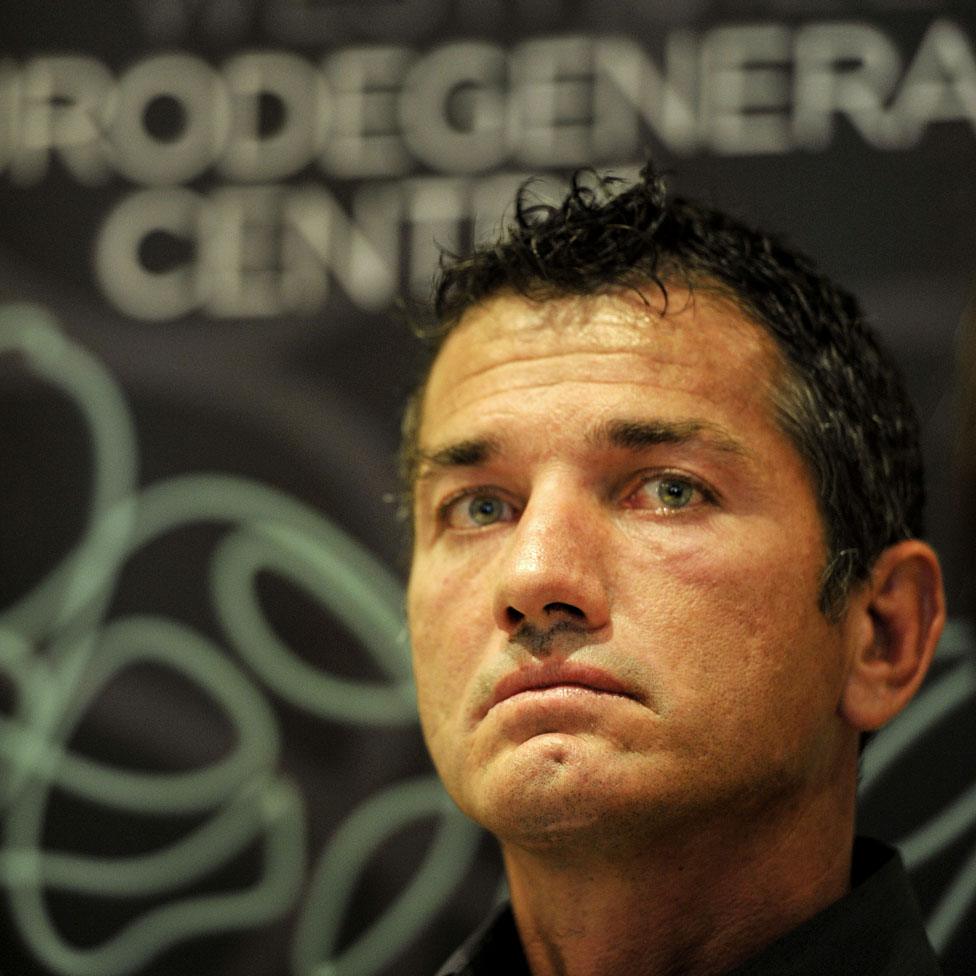
Joost van der Westhuizen was an inspiration for Doddie
Doddie Weir is not the first rugby international to face MND.
In 2011, South Africa's Joost van der Westhuizen revealed he had been diagnosed with the condition.
Doddie met Joost at Murrayfield many years before his illness and found him an inspirational character.
Joost died in early 2017, not long after Doddie's own diagnosis. Doddie studied his J9 Foundation, which seeks to raise awareness as well as improve the emotional and physical care of MND sufferers.
Doddie's foundation has now spent £4m over the last two years - £3.5m on research and £500,000 to help improve people's lives by providing cash for things like stair lifts, holidays and wheelchairs. It is also working on an end of life care package for patients.
The most important tip Doddie took from Joost was the benefit of positive thinking. "Use it or lose it" became his mantra.
'It was a great moment'
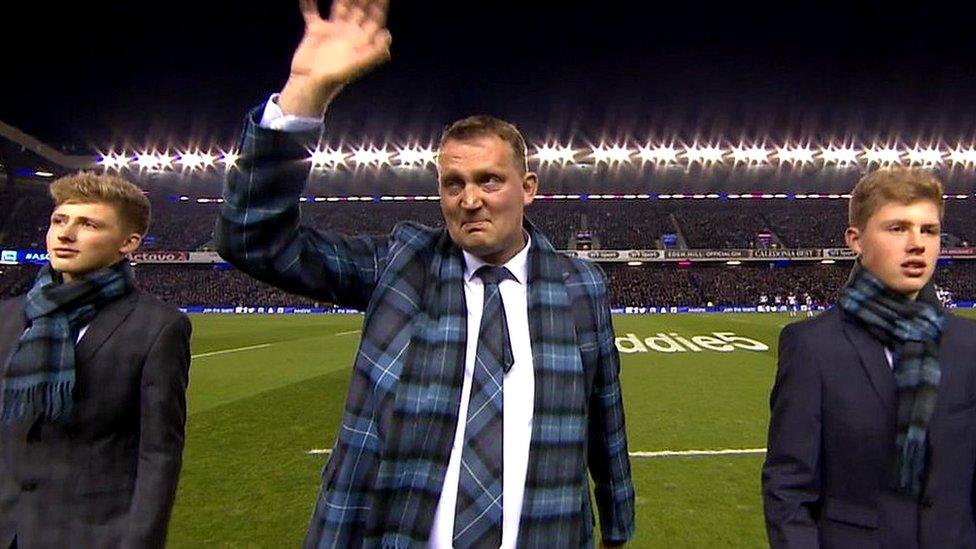
Doddie and his sons delivered the game ball at Murrayfield soon after the public learned of his diagnosis
By 2018, the family was trying to cram a lifetime of memories into as short a time as possible.
One of those memories came in November when Doddie and his teenage sons Hamish, 18, Angus, 17, and Ben, 15 , delivered the match day ball before Scotland's match with New Zealand at Murrayfield.
Hamish said: "As soon as I walked out it was amazing. It was the support that hit me. I was speechless. Looking back it was surreal and an experience I'll never have again.
"Gregor Townsend played a part in getting dad out. But I think that was the point when it hit dad.
"You could see him welling up, that's when it hit me. I think Gregor told them to go out and do it for Doddie. It was a great moment."
Doddie also wrote his autobiography, My Name'5 Doddie - a reference to his number five shirt number - and said one of the reasons was to let his sons know what he got up to on the tours with the Lions.
'Sympathy is lovely to get but hard to take'

The family have thrown themselves into the fundraising campaign
During 2018 Doddie and his foundation trustees also agreed their first investment into MND Research - £400,000 to support the work of Chris Shaw, Professor of Neurology and Neurogenetics, and his team at King's College London. They are spearheading work on gene therapy for Sporadic Motor Neurone Disease.
That came as more signs of the disease were starting to show.
Doddie said he was trying not to lose weight and joked that he never had a lot of muscle in the first place.
He said: "I can keep walking, talking, eating and sleeping unaided.
"Dressing is hard work. Eating, bringing hands to my mouth and drinking is getting more difficult.
"I'm maybe very lucky in some ways. It's directly started with my hands. Other people it starts with their voice, their eating, their legs. So in a way I can still do everything, although things are maybe a little bit slower than they used to be."
He said hardest part was when people said thank you.
"Sympathy is lovely to get but hard to take. It's just the emotional side of things that is hitting us hard," he said.
'Hopefully one day we'll get a cure'
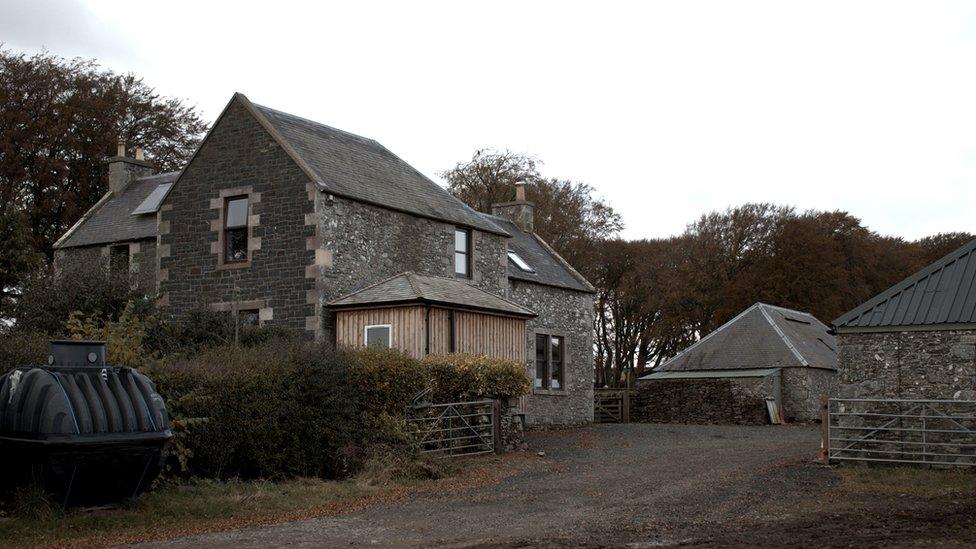
A pod has been built onto the side of the Weirs' home
The start of 2019 was accompanied by building work at the Weirs' home in the Borders.
A pod was fixed onto the side of the house which put all of Doddie's accommodation on the ground floor for when he needs it.
He explained: "This is for the eventuality that I can't go upstairs in the house. A room will be converted into my bedroom. The pod is at the side of the house and that can be moved on to someone else at a later date."
Doddie's engagements were cut back and he gave up his day-to-day work.
But he has also made more memories, picking up his OBE for services to rugby and to charity from the Queen at the Palace of Holyroodhouse in Edinburgh.
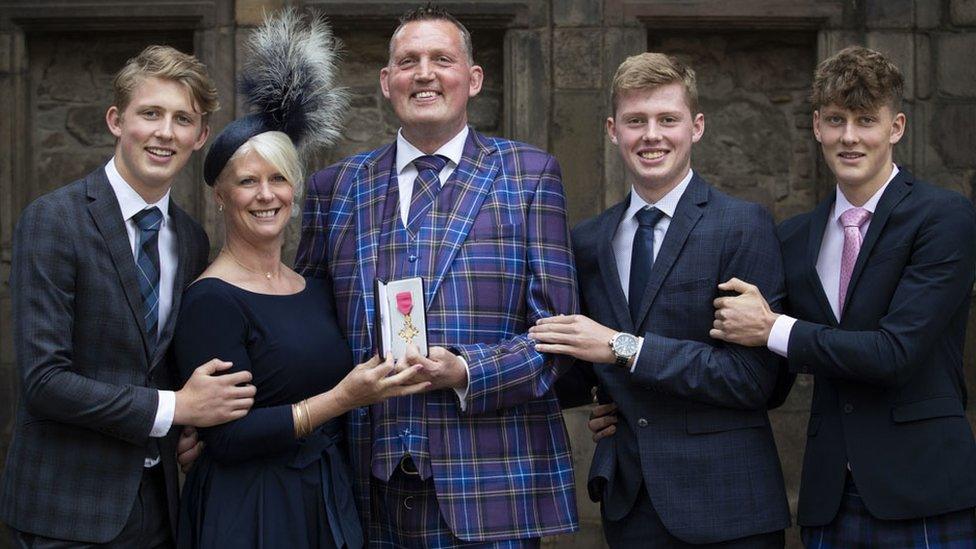
Doddie with wife Kathy and sons Hamish, Ben and Angus after receiving his OBE from the Queen at the Palace of Holyroodhouse
He said: "It's another memory for myself and the family and this horrendous MND.
"Hopefully one day together we'll all get a cure and I'll be here to annoy a lot of people for a long time. That's the goal."
However, June 2019 brought devastating news to the Weir family.
Doddie's beloved mother, Nanny, died after more than two years battling cancer. Her second diagnosis came at the same time as Doddie was diagnosed with MND.
Speaking shortly after her funeral, Doddie said: "Life has been pretty tough of late, losing mother. But it's one of the sure things that does happen. She had cancer and she was very strong."
Her death made Doddie contemplate the future.
He said: "I just wake up and get on with it. With Kathy - it must be difficult for her. I can see what is happening long-term, but she - bless her - can't do anything about it.
"We have a cuddle now and again to bring us all together and appreciate what we've got.
"I am one of the lucky ones - two-and-a-half years in and I am still here."
'I'm still here, still living life'
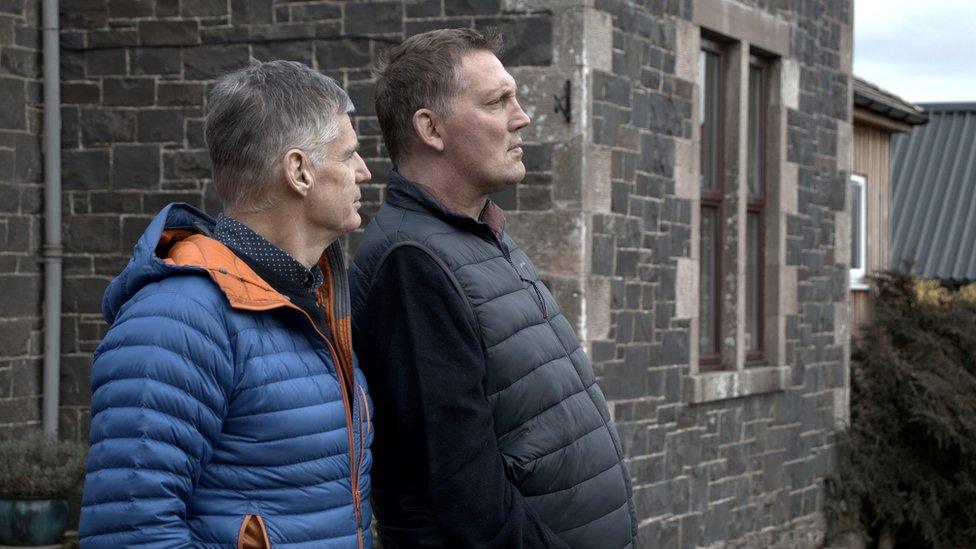
John Beattie followed Doddie Weir through a difficult two years
At the start of filming, neither Doddie nor John Beattie expected he would still be reasonably mobile by the time of their last interview in November 2019.
Despite what he was warned about three years ago, there is still no feeding tube, no oxygen mask, no stair lift.
But things have changed.
Doddie is thinner. He also has to cut his food up small and sometimes he wears a neck brace. He has just returned from a family holiday to Majorca where he choked on a piece of toast.
"The first one went down okay," said Doddie. "The second one got stuck in my throat. I had to ask for a serious bit of help from my good lady. If Kathy wasn't there and she didn't thump me in the back, I could have been in a bit of serious trouble."
He has had several falls. He says he has been complacent and needs to be aware of his condition.
Apart from that, he is still doing everything he was doing nine months ago.
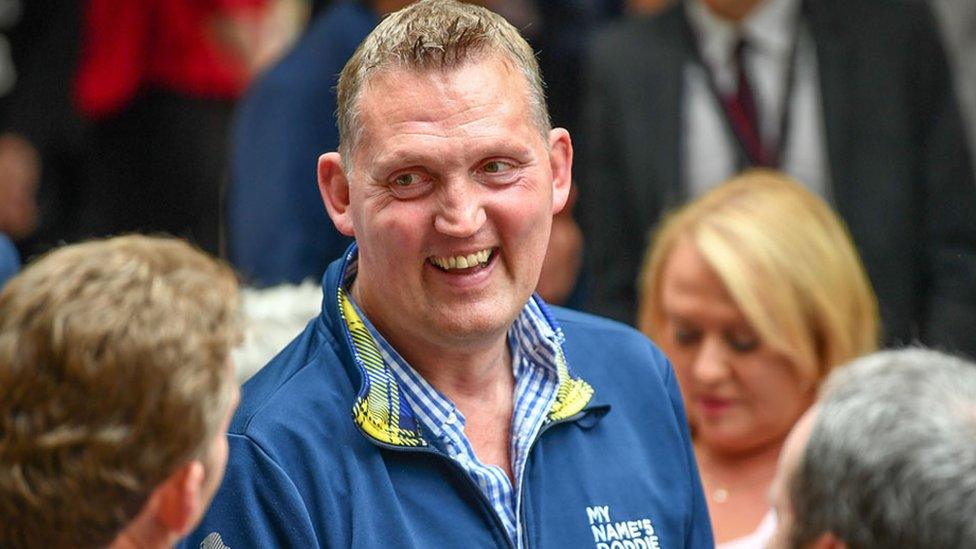
Doddie at the Scottish Parliament campaigning for automatic access to the blue badge scheme for people with MND
He said: "Why the progress is so slow we do not know. I don't think the professionals know either. But I am still here, still living life and still continuing."
He tells John: "The setting of goals now is smaller - getting up the stairs or getting out to check the cows. And getting to the weekend to watch the boys' rugby."
But there is still one big goal - the big party which is being planned for his 50th birthday in July next year.
Talking about this causes Doddie to break down. He is emotional talking about family.
An incidental connection?
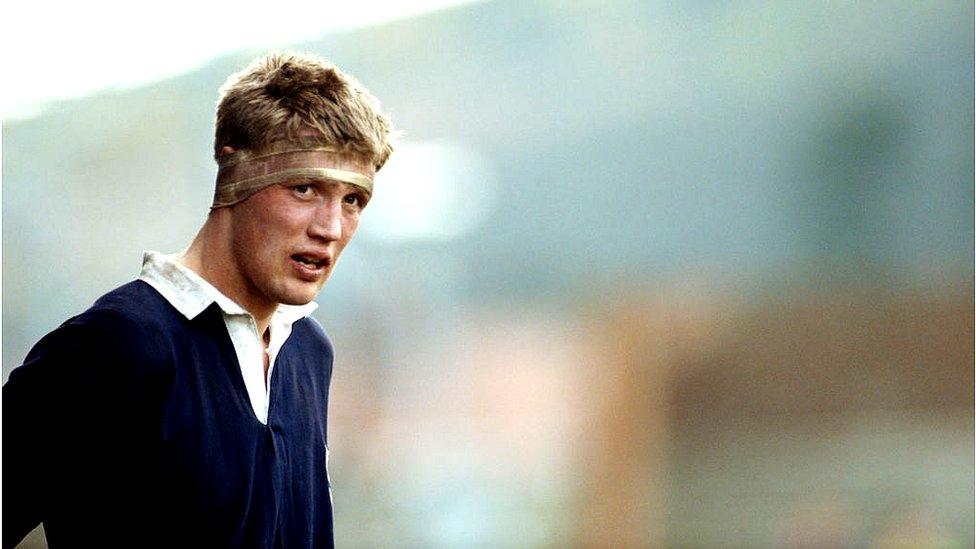
Doddie has also reconsidered his view on rugby's part in his disease.
Speaking in 2017, he was sceptical about any link between the sport and the condition.
He now says that, with hindsight, there could have been "some sort of incidental connection".
Doddie recalled being injured while playing in a game four years ago.
"They say these sort of collisions could have an effect on the brain," he said.
"Looking back it was probably not long after that injury that I got MND. But there are a lot of people who get MND who don't play rugby."
'If you give in what's the point of living?'
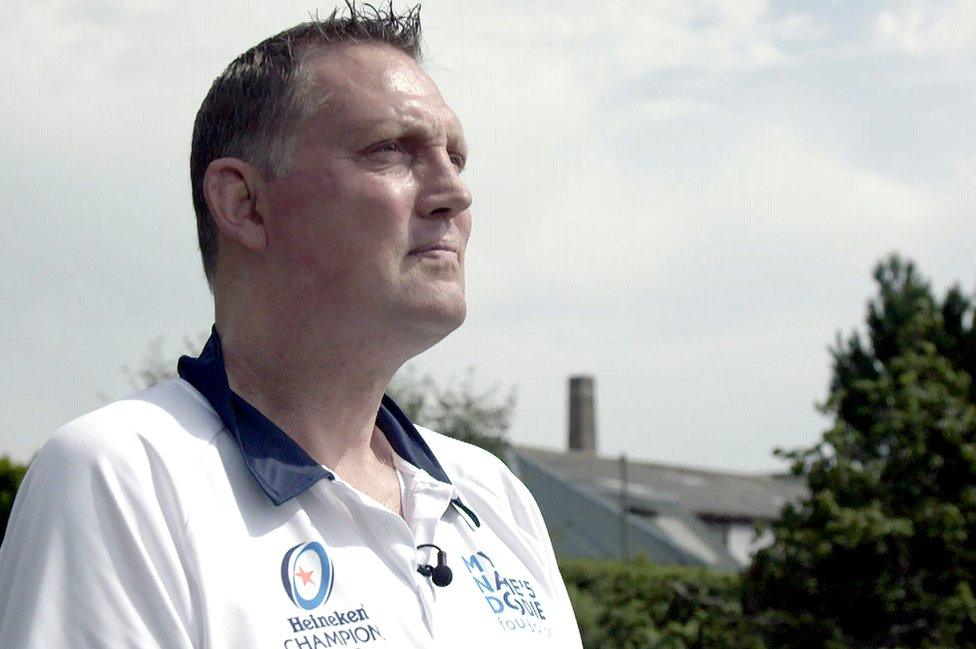
Doddie's next goal is his 50th birthday next June
Doddie says he doesn't regret letting the camera into his family's lives.
"The reason for doing this is to try to explain the frustrations," he said.
"From the day we were told I had MND there's been nothing on the table that people with MND can get hold of. That's unacceptable. The journey with the camera is to tell people what's out there, to tell people to keep a positive outlook - because that's the best and only drug that's available at the moment."
Doddie says he and Kathy are closer now because she has to do more for him - which now includes shaving. The boys are helping too.
He said: "The kids are doing things not a lot of teenagers don't need to do - like having to help dress their old boy. But that's life. They are adapting well."
Doddie won't let MND encroach on his life. He has still not agreed to having a peg (feeding tube) in his stomach.
He said: "In my head it's giving in.
"If I allowed the peg to go in, I wouldn't be able to swim - and swimming and aqua aerobics are an important part of keeping me where I am.
"I'm not giving in. If you give in what's the point of living? To me, the kids have still got a lot to do, and I'd like to support them.
"If you give in, I think the whole body gives in. That'll be the end and I don't want that to happen."
Doddie Weir: One More Try is available on the BBC iPlayer.